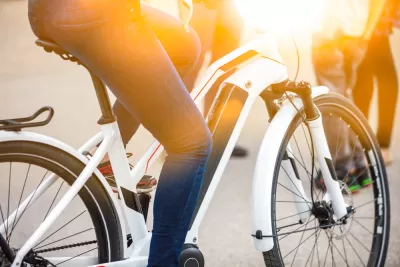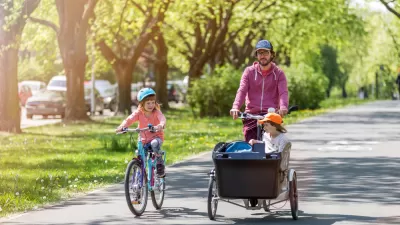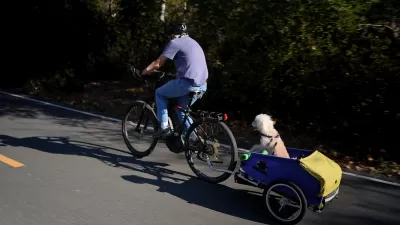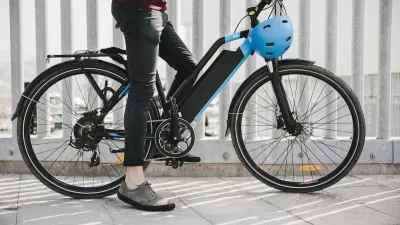A new white paper lays the groundwork for better e-bike incentive programs.

Kea Wilson reports for Streetsblog USA:
In a new white paper from Portland State University, researchers looked at more than 70 current, former, and upcoming efforts to subsidize the use of electric bicycles in the U.S. and Canada, and how those local programs might have an even bigger impact in the future — and eventually, win more funding at the local, state, and federal level.
As explained by Wilson, e-bike incentive programs can take many forms, such as rebates, vouchers, tax credits, and lending libraries. Many of these programs are already in place around the country. Denver’s e-bike rebate program, launched in April, is already proving popular. Los Angeles launched a Universal Basic Mobility program in April that included a lending library.
The benefits of e-bike incentive programs are measured in Vehicle Miles Traveled and Greenhouse Gas Emissions. “Early research has shown that 62 percent of North American e-bike trips replace a journey that would have otherwise been taken in a car, and access to e-bike share alone can reduce a city residents’ automobile mileage by 20 percent,” according to Wilson.
John MacArthur, sustainable transportation manager for the Transportation Research and Education Center at PSU, is quoted in the article describing the need to better make the case for the community benefits of e-bike adoption. To fulfill some of that purpose, MacArthur created an “e-bike incentive program tracker to see how the details of those North American programs stack up, followed by interviews with many of those programs’ administrators,” reports Wilson.
More findings from the white paper and the tracker can be found at the source article below.
FULL STORY: We Need More — And Better — E-Bike Incentive Programs Across America

Study: Maui’s Plan to Convert Vacation Rentals to Long-Term Housing Could Cause Nearly $1 Billion Economic Loss
The plan would reduce visitor accommodation by 25,% resulting in 1,900 jobs lost.

North Texas Transit Leaders Tout Benefits of TOD for Growing Region
At a summit focused on transit-oriented development, policymakers discussed how North Texas’ expanded light rail system can serve as a tool for economic growth.

Using Old Oil and Gas Wells for Green Energy Storage
Penn State researchers have found that repurposing abandoned oil and gas wells for geothermal-assisted compressed-air energy storage can boost efficiency, reduce environmental risks, and support clean energy and job transitions.

Private Donations Propel Early Restoration of Palisades Playground
Los Angeles has secured over $1.3 million in private funding to restore the Pacific Palisades playground months ahead of schedule, creating a modern, accessible space that supports community healing after recent wildfires.

From Blight to Benefit: Early Results From California’s Equitable Cleanup Program
The Equitable Community Revitalization Grant (ECRG) program is reshaping brownfield redevelopment by prioritizing projects in low-income and environmental justice communities, emphasizing equity, transparency, and community benefits.

Planting Relief: Tackling Las Vegas Heat One Tree at a Time
Nevada Plants, a Las Vegas-based nonprofit, is combating the city’s extreme urban heat by giving away trees to residents in underserved neighborhoods, promoting shade, sustainability, and community health.
Urban Design for Planners 1: Software Tools
This six-course series explores essential urban design concepts using open source software and equips planners with the tools they need to participate fully in the urban design process.
Planning for Universal Design
Learn the tools for implementing Universal Design in planning regulations.
Ascent Environmental
Borough of Carlisle
Institute for Housing and Urban Development Studies (IHS)
City of Grandview
Harvard GSD Executive Education
Toledo-Lucas County Plan Commissions
Salt Lake City
NYU Wagner Graduate School of Public Service





























